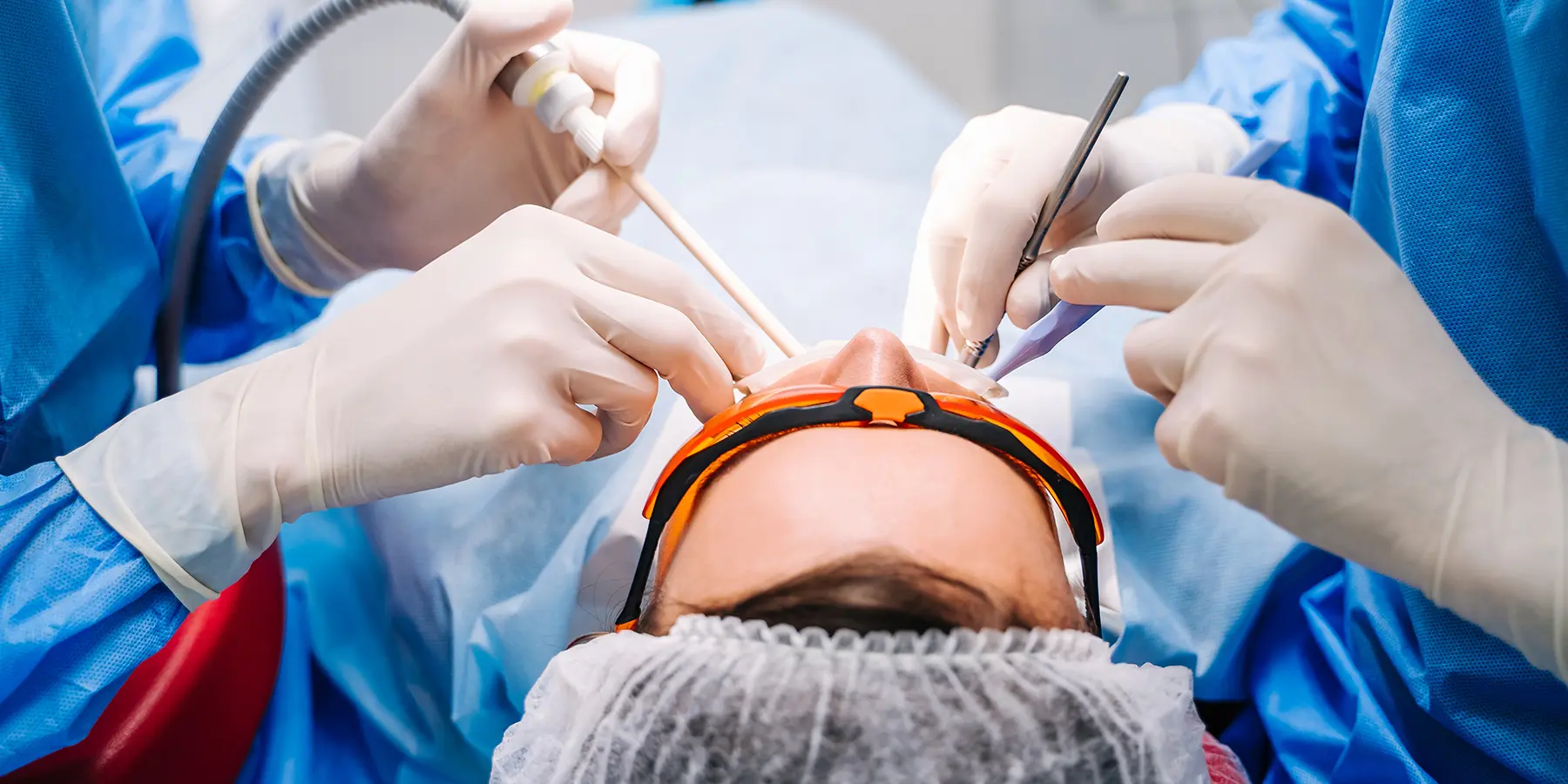Reviewed By Dr. Jeffery Kesecker, DDS
Reading Time: 4 minutes
If you are preparing for dentures or implants, your surgeon may have suggested alveoloplasty as part of your treatment plan.
This important oral surgery is designed to reshape and smooth your alveolar bone to provide a stable foundation for dental prosthetics.
In this blog, we will address the most frequently asked questions about alveoloplasty, including what it is, why it is necessary, and how it impacts your recovery and treatment outcomes.
Table of Contents
1. What is Alveoloplasty?
Alveoloplasty is a dental surgical procedure aimed to smooth and reshape the alveolar ridges (the bone that supports your teeth).
If you had a tooth extraction (or several teeth extracted), your jawbone may have sharp edges or uneven areas that could affect the fit of dentures or implants.
The alveoloplasty procedure removes or smooths these irregularities to create a stable surface for your dental prosthetics.
2. Why is Alveoloplasty Necessary?
After tooth extractions, your alveolar bone may not heal evenly, which can lead to bone loss or bone resorption. It can interfere with the fit and function of implants or dentures.
By removing sharp edges and bone abnormalities, this procedure helps prevent complications like bone necrosis or infection and promotes better implant integration.
3. Who is a Candidate for Alveoloplasty?
You may be a candidate for alveoloplasty if you have had tooth extractions and are planning to get dentures or implants. If your alveolar ridges are uneven, have sharp edges, or exhibit bone resorption, this procedure will create a more stable surface for your new teeth.
Candidates should be in good health and free from conditions like gum disease or severe autoimmune diseases that could affect bone healing.
4. What Are the Benefits of Alveoloplasty?
The main benefit of alveoloplasty is that it ensures a better fit for dentures or implants. By creating a smooth surface on the alveolar bone, the procedure improves denture retention and the overall comfort of your dental prosthetics.
It also helps prevent implant failure by ensuring proper implant integration and reducing the risk of infection or bone abnormalities in the future.
5. How Can I Prepare for Alveoloplasty Surgery?
To prepare for alveoloplasty surgery, there are a few steps you can take to make sure the procedure and recovery go as smoothly as possible:
- Follow pre-op instructions: Your oral surgeon will provide specific guidelines, including any restrictions on food or drink before surgery, especially if sedation will be used. Make sure you follow these instructions closely.
- Arrange transportation: Since alveoloplasty often involves anesthesia, it’s essential to have someone drive you to and from the appointment for your safety.
- Stock up on soft foods: Plan ahead by getting soft foods like yogurt, soup, smoothies, and applesauce for the days following surgery. These will be easier to eat without straining your healing mouth.
- Plan your rest: Try to clear your schedule for at least 24-48 hours after surgery to give your body time to recover. Avoid strenuous activity and allow time for plenty of rest.
- Discuss medications: If you take any medications, discuss them with your surgeon. Some medications may need to be adjusted or paused before surgery.
- Prepare your home for comfort: Have items like gauze, ice packs, and over-the-counter pain relief medications (as recommended by your surgeon) on hand.
6. What Can I Expect During the Procedure?
The procedure is performed using local anesthesia and sedation so you should not feel any pain.
Your oral surgeon will use special instruments to smooth out the alveolar bone. If necessary, they may remove excess bone tissue or reshape areas of the alveolar process to ensure a proper foundation for implants or dentures.
The procedure generally lasts 30 minutes to an hour, depending on the complexity.
7. What is the Recovery Process Like?
You can expect some swelling and mild discomfort.
You may be prescribed pain medication or antibiotics to help manage discomfort and reduce the risk of infection.
During your recovery, you should avoid crunchy, spicy, or sticky foods to allow the surgical site to heal. You should also refrain from vigorous activity and follow post-op instructions carefully.
Make sure to attend all of your follow-up appointments.
8. How Does Alveoloplasty Impact Dentures or Implants?
For dentures, it helps create a stable, smooth surface for better denture retention and comfort.
For dental implants, the procedure ensures the alveolar bone is shaped correctly to support implant placement and implant integration.
The smoother and more stable the bone, the better your implants will integrate, reducing the risk of complications and promoting long-term success.
Trust Legacy Surgery For Your Oral Surgery Needs
To learn more about alveoloplasty or to discuss your oral surgery needs, book an appointment at our oral surgery office in Harrisonburg, VA or Staunton, VA.
We offer a full range of procedures, including dental Implants, All-on-4 dental implants, implant-supported dentures, wisdom tooth removal and more.
To book an appointment at our Harrisonburg location, call (540) 437-1230. To book an appointment at our Staunton location, call (540) 213-8750. You may also complete the online inquiry form and we will contact you to schedule an appointment.
Our Harrisonburg office is located at 2071 Pro Pointe Lane, Harrisonburg, VA.
Our Staunton office is located at 110-C Mactanly Pl., Staunton, VA.

